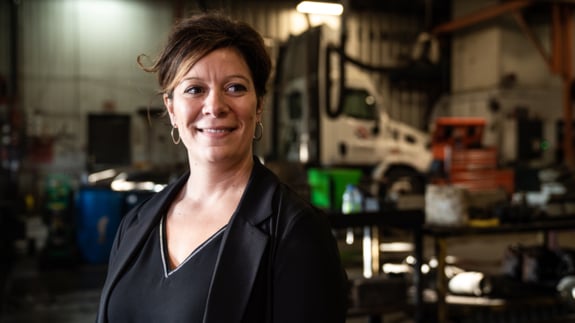Separating business from family: How four sisters made a successful family business transition

For the four Thuot sisters, their parents' company, Techno Diesel, has always felt like the fifth child in the family. And although this familiarity has prepared them to ensure the sustainability of the heavy truck repair shop, they still had to overcome a number of challenges to successfully transition the business to the second generation.
Because, beyond the difficulties that normally come up when a company's founders leave, the sisters also had to learn to manage their family dynamics.
"As a teenager, collaboration wasn't a habit for me or any of my sisters," says Caroline Thuot, now CEO of the company, which is based in Joliette, Quebec. "Our mother taught us that the next generation should be respectful and learn to work with the team, clients, and suppliers.”
It is that shared vision of service, and the complementarity of the strengths of each team member, that enabled the Thuot sisters to make a successful business transition as a group. It also provided an opportunity for continued growth for the business, which now has 110 employees.
A tight-knit family business
Founded in 1977 by Marcel Thuot, Techno Diesel was run by two people from the start. Mr. Thuot looked after the shops and business development, while his wife, Jacinte Mailhot, was in charge of business administration and management.
"Even though their roles weren't really clear at first, they were a truly incredible team. They were always a business couple united by the sacred bond of the garage," says Caroline Thuot.
We played in the trucks or with the phones while having fun with the intercom. It was our second home, really.
Caroline Thuot
Chief Executive Officer, Techno Diesel
Initially focused on repairing diesel motors, the couple eventually decided to concentrate on repairing trucks, a decision that allowed the business to expand just as the family got bigger with the arrival of the four girls.
And so the business and the girls grew together. In the evenings, at supper time, Ms. Mailhot would ask each of her daughters how their day had gone, and it would be followed by various conversations about what happened that day at Techno Diesel.
"We played in the trucks or with the phones while having fun with the intercom.It was our second home, really."
Separating business from family
Each following their own path, the sisters joined the family business one by one starting in 2001. In 2011, Techno Diesel acquired Chevrette Réparation, gaining a new business partner of the same age as the sisters: Vincent Brault.
Over time, the new generation grew in experience and responsibilities and eventually felt ready to take over the business. But their mother wanted them to get external help to ensure a smooth transition.
With this support, they were able to set up a four-level structure that helped them separate family issues from the governance and management of the business. Thus were formed an executive committee, consisting of the company's managers; an advisory committee, made up of external entrepreneurs, to advise the strategic vision; a board of shareholders, to which the CEO must report; and a family council, to discuss family relations.
"We're not always in meetings, don’t worry! But these various instances taught us how to separate what we had to say and choose the right context to say it," says Caroline Thuot.
We all want to be involved. We need to be considered. We want to be able to showcase our talents. But to do that, there needs to be room for creativity.
Caroline Thuot
Chief Executive Officer, Techno Diesel
The family council, in particular, allowed them to overcome the pitfalls lurking in many family business transitions.
"Still today, we really ask ourselves, 'How is it going?'" explains Caroline regarding the family council. "How is it going with me? And with my sisters, my parents? How is my role at work? You see, I work with my sisters, who are also my friends, and also my business partners."
New generation: New approach
The transition from one generation to another also provided the sisters with an opportunity to review the way things were done. The parents' rather hierarchical management style was replaced with a structure that allows several people to take part in business decisions.
"When we talk about governance structure, it's also about enabling shared decision making," explains Caroline. "We're five young people under 40 who co-own a business. And we do it together. And that, that’s a new management approach."
"We all want to be involved. We need to be considered. We want to be able to showcase our talents. But to do that, there needs to be room for creativity," she adds.
Diversification and expansion
Looking back, the four sisters are very proud of their journey and what they have accomplished together and feel ready to take on new challenges.
“Our parents built a wonderful business and they had to patience to share with us their love for the people that contributed to it and that ensure it can remain sustainable,” says Caroline.
In 2013, the succession team convince the shareholders, who still include the parents, to enter a new industry: Manufacturing and distributing tarps for heavy vehicles. “This new segment allows us to be present across the Canadian territory as well as continue to pursue our mission of being a leader in the services we offer to the owners of heavy vehicles,” explains Caroline.
"It's extremely stimulating how much you learn from this," she says. "At this step where we’ve arrived, we can really say that the business transmission to the second generation was successful. We are now talking about development and growth, with our twist and aspirations, but always guided by our history and the success of the last 40 years. And then, very soon, it will be time to start thinking about the third generation!"